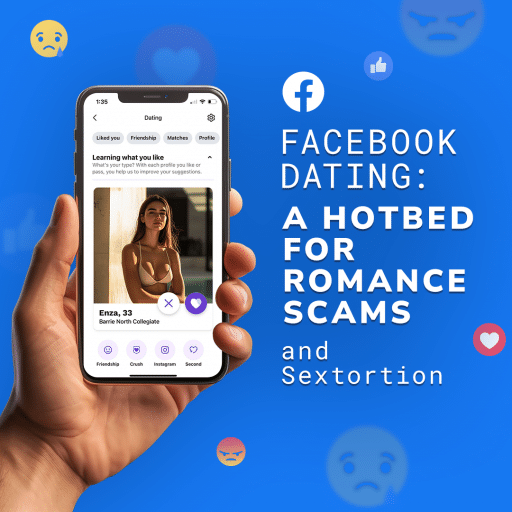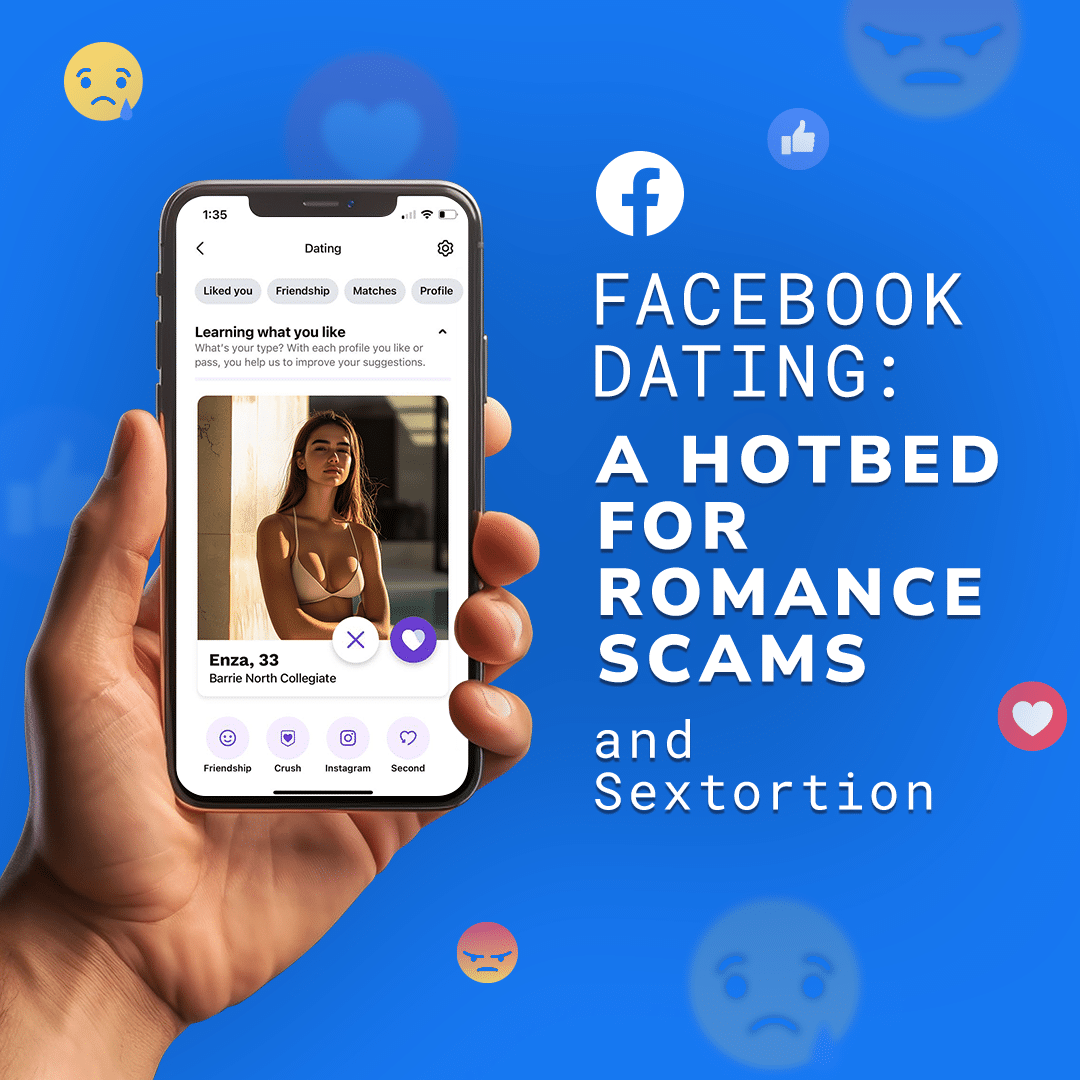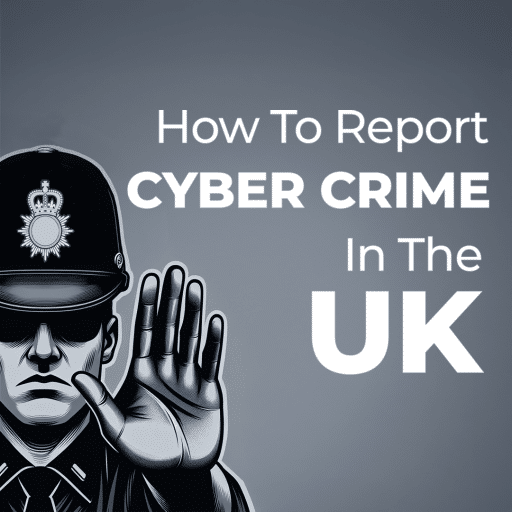Facebook is arguably an epicenter for social media scams. It is the largest social media platform with a small number of limitations of who can create an account. Naturally, cybercriminals gravitate to the platform to find more victims to exploit.
With the launch of Facebook Dating in 2019, a built-in dating service, it was only a matter of time before the flood of Facebook scammers carried over into the new section of the platform. In fact, in 2023, the FTC reported that Facebook and Instagram accounted for forty-two percent of reported romance scams on social media(1).
However, Facebook Dating continues to have value for many users with unique features, networks, and an audience that is difficult to find elsewhere. To use Facebook Dating safely, you must be aware of the dating scams that exist on the platform and how they work.
Understanding the Scam: How It Works on Facebook Dating
When it comes to dating scams, there are many that you should be aware of. However, Facebook Dating scams are primarily sextortion and romance scams. These two dating scams have different outcomes but the perpetrators use similar tactics to get there. Sextortion refers to a form of online blackmail where a scammer threatens to expose a victim’s explicit content unless they are paid a certain amount.
On the other hand, a Facebook Dating romance scam is when a catfisher lures a user into a fraudulent romantic relationship only to manipulate the victim into sending them money or gifts. In sextortion, the payment is always demanded through online blackmail whereas a romance scam is typically through deception.
Building False Trust and Emotional Connections
Cybercriminals using Facebook Dating for sextortion or romance scams will build trust in similar ways. They will create a fake profile using an attractive person’s likeness to lure in unsuspecting users. To gain trust, they will shower the victim with compliments and consistently respond to messages to keep the conversation going. There is typically a lot of affection as well. Perpetrators will create a sense of closeness by sharing vulnerable moments with the victim. This could be a false secret, sob story, or a claim to feel a deep connection.
At the end of the day, the scammer does not care about you or even explicit images, they only want money. They are often impatient and will push to move the relationship along quickly. In the case of Facebook sextortion, there may be a quick escalation from flirting to sexual conversations and an urgency to be intimate now.

The Transition to Sextortion: Exploiting Vulnerability
When it comes to Facebook Dating and sextortion, you should be cautious of sharing explicit content with any user online. Scammers use catfishing profiles to target users who are unfamiliar with their tactics. After building a relationship and trust with you, they will push the relationship into a sexual one.
The sextortionists will often send a fake explicit image of themselves first to make the victim feel more comfortable sending an image in exchange. The key to the scammer’s manipulation is to pressure the victim into a compromising situation quickly and disguise it “as spontaneous fun”.
Once the images or videos are exchanged, the blackmailer drops the catfishing persona and threatens to expose the explicit content to the victim’s family and friends. The conversation typically turns aggressive at this point with the sextortionist sending constant threats unless they are paid by a certain time.
The blackmailer’s intention is to use shame, fear, and urgency to force victims into paying the them before they can even think. They may send screenshots of the explicit content being sent to your family or friends or may create a group chat with your followers on Instagram if your account is linked on Facebook Dating.
The Transition into a Romance Scam
Unlike with sextortion on Facebook, romance scams tend to be a longer process ranging from weeks to months and sometimes years. Scammers want to build trust with the victim and will often create an emotional dependence with the victim by consistently love bombing them.
Once they have built enough trust, however, they will create a scenario in which money is needed. Common romance scam scenarios are travel expenses, medical emergencies, short-term loans, sick relatives, crypto investments, and more. The scammer will request money from the victim and will manipulate them with guilt, urgency, and false promises of repayment. Once a scammer is paid, they will continue to request more money until the victim refuses or is out of money. This is when a romance scam can decline into sextortion if explicit content was exchanged.
Recognizing the Red Flags: Warning Signs to Watch For
Scammers using Facebook Dating for romance scams or sextortion will stick to the same methods, making it easy to spot the warning signs. It’s important to stay vigilant on dating sites. Approaching each potential relationship with skepticism and caution will allow you to quickly spot scammers and report them to the platform authorities. Here are the common red flags for Facebook Dating scams to look out for.
- Quickly moving the conversation off Facebook Dating. Facebook Dating has a reporting system and community guidelines against scam-like behavior. A cybercriminal may direct a conversation onto another platform like WhatsApp or Facebook Messenger that provides more privacy in direct messages.
- Request money through untraceable means. Cryptocurrency and gift cards were common methods of payment in Facebook Dating scams. However, these are peculiar payment methods and difficult to trace with digital forensics.
- Moves a relationship forward rapidly. When using Facebook Dating for romance scams, the perpetrator will confess their feelings or discuss marriage quickly into the relationship.
- Inconsistencies in the story. Scammers are making up a catfishing persona as they go and they make many mistakes when doing so. There is bound to be inconsistencies in their stories, locations, phone number, profession, etc.
- Avoids meeting face-to-face. In Facebook Dating romance scams, the perpetrator will advance the relationship without any face-to-face contact. They may pose as a military officer or a profession that is remote and has many limitations. However, they will continue to make false promises to meet face-to-face one day.
- Images are fake or stolen. Catfishers commonly steal images off other profiles or use generative AI to create fake images. Images that are too perfect, resemble stock photos, or that have editing flaws are serious red flags. You can also reverse image search their images to see if they belong to anyone else.
The use of Deepfakes and AI generated content
With the introduction of AI technology, Facebook Dating scams are now entering a new territory. It’s now possible to go through sextortion without ever sharing any explicit content. Sexual deepfakes are commonly used in Facebook Dating sextortion and it can bring on the same distress as if the images or videos were real. Generative AI is also being used to create images on a profile which makes reverse image searching them impossible. However, deepfakes and generative AI make many mistakes, and you can use these signs to spot catfishers quickly.
Immediate Actions: What to Do If You’re a Victim
Being a victim of a Facebook Dating scam can feel as if your world is crashing down. You may not have thought that it could ever happen to you and yet it happens to thousands every year. However, the situation is not without hope. There are immediate steps you can take to improve the situation.
Documenting Everything: Preserving Evidence
When dealing with a Facebook Dating scam, you need to document all the evidence. Take screenshots of every message, record the explicit content, funds sent or demanded, the profile, etc. The evidence is necessary for law enforcement to be able to act against your perpetrator or for a legal professional to take civil action.
It’s also essential to not delete anything. Cybersecurity experts in law enforcement or at a private firm can use your messages to track down the perpetrator. All information is important. You need to make sure the evidence is stored safely and in a separate location.
Reporting Facebook Dating Scams
One of the first things you should do in a Facebook Dating scam is report the incident. You should report the incident to Facebook and to the authorities. Here is how you report a Facebook Dating romance scam on the platform.
- Go to Facebook Dating.
- Click on “Matches”.
- Select the conversation with the scammer.
- Click the three dots.
- Select “Scam”.
- Select “Romance Scam”.
Many people dealing with Facebook Dating sextortion may feel compelled to block the perpetrator. However, this can cause the sextortionist to release the explicit content in retaliation. Instead, it’s better to report the blackmailer to get their profile removed anonymously. Here is how you report a Facebook Dating sextortion incident.
- Go to Facebook Dating.
- Click on “Matches”.
- Select the conversation with the scammer.
- Click the three dots.
- Select “Harassment” or “Sharing inappropriate things”.
- Choose the relevant prompt for your circumstance.

Reporting to Law Enforcement
When it comes to Facebook Dating sextortion and other scams, you should always report it to the authorities. Start with your local police department. They can help you file a report and advise you on what next steps would be best. Also, file a report with the FBI Internet Crime Complaint Center (IC3)(2). They have a national database of cybercrimes and may even take on your case. If the victim is a minor, you can also report the crime to the National Center for Missing and Exploited Children using their CyberTipline(3).
Digital Forensics Corp: Protecting Your Content and Reputation
Whether it’s online blackmail or a romance scam, victims can get immediate assistance at Digital Forensics Corp. Our investigators specialize in analyzing digital footprints and evidence. We work to unmask cybercriminals wherever they are around the world and can even remove the leverage that the criminals have over you in cases of online blackmail.
Our team of digital forensic analysts can also monitor the internet to quickly identify and remove any unauthorized explicit content. We also work with social media platforms to ensure any non-consensual intimate image abuse is removed before getting any exposure. If you are a victim of a Facebook Dating Scam, you do have options to fight back and working with Digital Forensics Corp. is an effective one.
Prevention Strategies: Staying Safe on Facebook Dating
Facebook Dating is full of scammers but the best way to stay safe is by avoiding them entirely. There are best practices to follow that can minimize the risk of using Facebook Dating. Here are some of the best preventative strategies to stay safe on Facebook’s dating platform.
- Verifying profiles and using reverse image searches. The information provided in the catfishing profile is incredibly important. You can verify the legitimacy of profile images with a reverse image search. Tineye and Copyseeker are two online tools that can be used for reverse image searching.
- Protect your personal information. The less information that a potential scammer has about you, the better. Facebook Dating is separate from your main profile but there is still a connection. You can also link your Instagram account in Facebook Dating. However, cybercriminals can use these profiles to learn more about you and your close connections. Any personal information can be weaponized by a scammer.
- Being Wary of Requests for Money or Intimate Content. Any request for money or intimate content in a short amount of time is a glaring red flag. Even after talking with someone for an extended period, it’s still not safe to share intimate images with them. You may not always be on good terms with your partner and they can use those images against you at any time. If you do decide to share intimate content, make sure to remove any identifiable features or background details to minimize any potential harm.
Utilizing Facebook Dating’s Built-in Safety Features
Facebook Dating has implemented various safety measures to reduce the number of scams. The dating platform requires all users to be over eighteen and has an age-verification feature where users are required to confirm their age through their ID or a video(4). You can also change your privacy settings so that only friends of friends see your profile on Facebook Dating(5). These measures can be worked around by scammers but they are a step in the right direction.
Taking Control and Seeking Help
There are many resources that are at your disposal if you are a victim of a dating scam. Local law enforcement can help you with initial steps, an attorney can help you with any legal options, and Facebook’s reporting system may be able to stop your scammer in their tracks. However, Digital Forensics Corp. is also available 24/7 to help any victim of a dating scam. Contact us today if you need professionals to fight on your behalf against your scammer.
Sources:
- https://www.ftc.gov/news-events/data-visualizations/data-spotlight/2023/10/social-media-golden-goose-scammers#9
- https://www.ic3.gov/
- https://report.cybertip.org/
- https://about.fb.com/news/2022/12/facebook-dating-age-verification/
- https://www.facebook.com/help/247036182683165/
DISCLAIMER: THIS POST IS FOR INFORMATIONAL PURPOSES ONLY AND IS NOT TO BE CONSIDERED LEGAL ADVICE ON ANY SUBJECT MATTER. DIGITAL FORENSICS CORP. IS NOT A LAWFIRM AND DOES NOT PROVIDE LEGAL ADVICE OR SERVICES. By viewing posts, the reader understands there is no attorney-client relationship, the post should not be used as a substitute for legal advice from a licensed professional attorney, and readers are urged to consult their own legal counsel on any specific legal questions concerning a specific situation.







